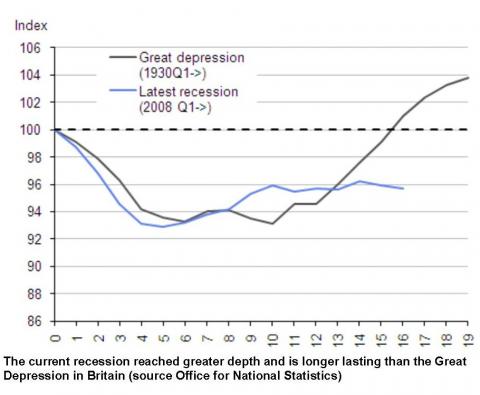Submitted by World Revolution on
The question of ‘the economy’ – that is, rising unemployment, debt and inflation, diminishing pensions and wages and so on, ad nauseam – was at the centre of the recent local government election campaigns in Britain, just it was in the French presidential elections and Greek parliamentary elections. All the parties who take part in these, and all other bourgeois elections, tell us to vote for them because they can deal with the economic crisis, while blaming the other parties for getting us into the crisis in the first place. They are all lying. Whatever policies they follow, this crisis can only get worse.
Britain is officially back in recession, although growth has been so sluggish in the last year most people probably won’t notice much difference. David Cameron blamed the ongoing Euro-crisis; Ed Miliband blamed David Cameron; Mervyn King wasn’t sure if the figures were right but decided to blame over-borrowed consumers for getting us into the mess in the first place. Naturally, no-one blamed capitalism.
Despite the unprecedented austerity programme to bring down government debt, the weak growth may actually see borrowing rise: “Unveiling its new economic outlook, the CBI said net borrowing ... would rise from £126bn to £128.2bn this year, compared with the official forecast of a fall to £120bn. The extra borrowing would more than offset the £18bn of fiscal consolidation planned in 2012.” (Daily Telegraph 3/5/12)
Britain is not alone in its economic difficulties: “Traders were rattled when the US Labor Department said fewer jobs have been created than analysts expected and the labour market as a whole had shrunk. The figures combined with alarming economic data showing that the services sector in France, Italy and Spain contracted last month.” (Telegraph 4/5/12)
Unemployment across the Eurozone is now 10.9%. In Spain, unemployment has now hit 24.4%, with over half (51.1%) of under 25s out of work.
At the global level, the latest report from the International Labour Organisation, stated that “one in three workers worldwide – or an estimated 1.1 billion people – [are] either unemployed or living in poverty”[1]. It estimates that, globally, 50 million jobs are needed just to return the world to pre-2008 levels.
While the ruling class attempts to present the crisis as a local problem, solvable if only we could get the right government in, the widespread nature of these problems shows they are the product of a global system in its deepest ever economic crisis – deeper than the Depression of the 1930s, and even more impervious to any solution, since the economic storms we have been through since 2008 are only the culmination of difficulties which have been mounting up since the end of the 1960s.
In spite of the trillions spent on rescue packages and the vast quantities of money pumped into the economy, the alleged ‘recovery’ is still standing on the edge of an abyss. The austerity programmes that were meant to rebalance the economy and pay off the debt are making the debt problem even worse. Yet more spending is unsustainable but the austerity programmes simply phase in the crisis.
In the end, it is the working class that pays the price for the crisis in the form of unemployment, wage cuts, increasing workloads and declining social services. As the economy continues its slow disintegration workers will be faced with a choice: remain passive and make ever more extreme sacrifices to keep a hopeless system going; or begin to defend their collective interests, resist capitalism’s demands and open the gates to a real solution to the economic dead-end: the revolutionary transformation of society.
Ishamael 5/5/12
[1]. https://www.ilo.org/global/about-the-ilo/press-and-media-centre/news/WCM... / Global Employment Trends 2012, ILO.







 del.icio.us
del.icio.us Digg
Digg Newskicks
Newskicks Ping This!
Ping This! Favorite on Technorati
Favorite on Technorati Blinklist
Blinklist Furl
Furl Mister Wong
Mister Wong Mixx
Mixx Newsvine
Newsvine StumbleUpon
StumbleUpon Viadeo
Viadeo Icerocket
Icerocket Yahoo
Yahoo identi.ca
identi.ca Google+
Google+ Reddit
Reddit SlashDot
SlashDot Twitter
Twitter Box
Box Diigo
Diigo Facebook
Facebook Google
Google LinkedIn
LinkedIn MySpace
MySpace